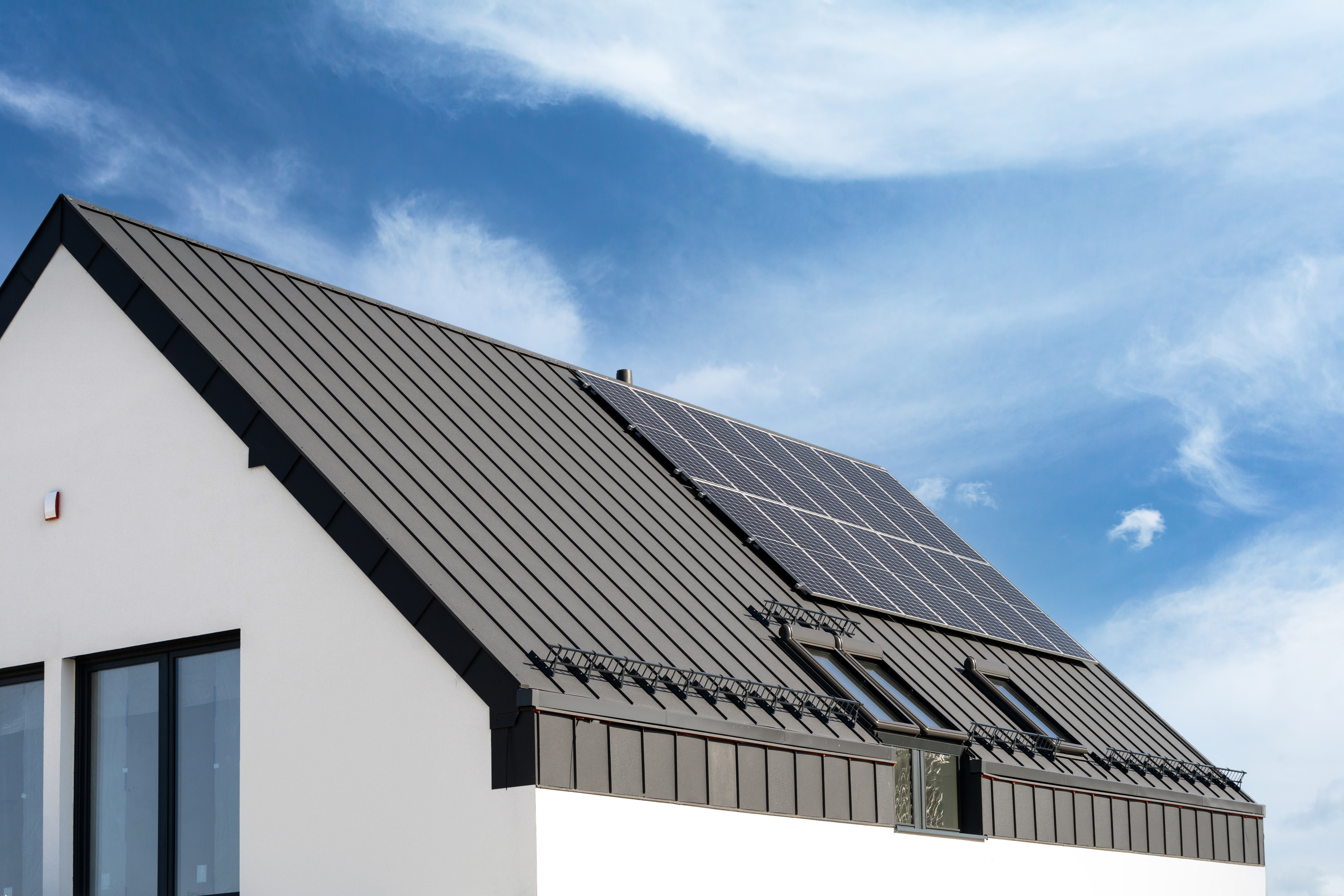
A metal roof can defend your home against Ohio’s varying weather conditions. Learn how much a metal roof costs in Columbus, OH.
Your current warranty may not completely protect your expensive new roof


Roof replacement is expensive; get warranties for materials and installation.
There are three main types of warranties to consider.
Coverage varies; make sure you understand your warranty and keep it active.
Roof replacement is often one of the most expensive home projects you can undertake. Average costs range from $5,000 on the low end to tens of thousands of dollars on the highest end, depending on the materials and on size and slope of your roof. For instance, metal roofs may cost more to install, repair, and guarantee than other types, such as traditional shingle roofs. But even the most costly new roof may not be completely covered by a warranty.
Warranties may cover materials, and some will cover installation, guaranteeing the roofer’s work for a limited amount of time. But typical warranties are often limited in what they cover, and a number of conditions may apply. Below we’ve outlined some important information so you can make sure your roof is covered.
Both manufacturers of roofing materials and roofing installation contractors offer warranties. While some larger companies offer bespoke plans, in general, roof warranties can be categorized into three broad types.
| Type of Roof Warranty | What’s Covered | What’s Not Covered |
|---|---|---|
| Manufacturers’ warranties | Guarantees roofing materials against defects or failures for the typical life span, and most manufacturers will guarantee architectural shingles for a longer period than three-tab shingles. | Can be voided if the materials aren’t installed or maintained properly, and typically doesn’t cover common causes of premature roof failure (poor installation, insufficient maintenance, or severe weather damage). |
| Installation and contractor warranties | Many roofers will offer limited guarantees on their work and often offer significantly more protection than the standard manufacturer’s warranty, and longer warranties are often reserved for higher-end products, such as slate or metal roofs. | Doesn’t include problems unrelated to their craftsmanship or quality of the installation (damage from wind, storms, trees, or ice dams and alternations made after the installation). |
| Extended manufacturers’ warranty | Defects in the materials and installation (typically you’ll have to work with certified contractors selected from an authorized list), designed to cover an entire roofing system, and a full roof replacement if any one component fails. | Won’t cover the roofing system if certain components aren’t installed (underlayment, leak barriers, hip and ridge shingles, venting, and starter shingles). |
Most roof installation or replacement projects are covered, at least partially, by manufacturers’ or product warranties. The roofer can typically provide these warranties, or the customer can find them on the manufacturer’s website. These warranties guarantee the materials against defects or failures for the typical life span of the materials. In most cases, this means they are covered as long as you own your home, but the full length of the warranty depends on the roofing materials used and the location of your home. Pricier, high-end materials can be expected to last longer than their less expensive counterparts, so most manufacturers will guarantee architectural shingles for a longer period than three-tab shingles, for example. The average range is 25 to 50 years, but some warranties indicate a life span as short as five years, so it’s important to read the fine print. Keep in mind that the warranty can be voided if the materials aren’t installed or maintained properly.
Defects in the materials, though, are rare, and they do not usually lead to roof failure. So while manufacturer warranties may offer some protection, they don’t usually offer much of a guarantee against the more common causes of premature roof failure—poor installation, insufficient maintenance, or severe weather damage.
Provided by the roofer, installation warranties often offer significantly more protection than the standard manufacturer’s warranty. But these warranties, too, can vary greatly depending on the type of warranty and who is issuing it.
“This is the one you should ask to have as part of your contract verbiage,” says Keith Jacob, President & CEO of Integrous Roofing & Restoration. “This is the one you really want to understand if something goes wrong. In short, it's where the roofer states clearly what is and what is not covered in the warranty, and for how long. This focuses on the quality of the craftsmanship and if there is any failure due to the way the roof was installed.”
Many roofers will offer limited guarantees on their work. If, later on, you hire a different contractor to repair or maintain the roof or if you try to do the work yourself, you could void the warranty.
In addition, the typical asphalt roof usually only has a life span of between 25 and 30 years. Most contractor warranties, though, often expire long before that time, typically guaranteeing the roof for five to 10 years.
You may be able to negotiate with your contractor for a longer warranty, but it will probably cost you. Still, though, the cost of an extended warranty will often be far less than roof replacement costs. Some contractors will offer guarantees for as many as 25, 30, or even 40 years.
These extended warranties are often reserved for higher-end products, such as slate or metal roofs, which typically cost more. You can expect to pay a pretty penny for the warranty too—as much as $3,000 for the additional coverage. If you save money by learning how to install metal roofing as a DIY project, there isn’t any kind of warranty that might cover your own work.
But damages can be quite the headache, leading to dangerous roof leaks that can not only be a real health hazard but can also weaken the structural integrity of your home. And given the high costs of replacing a leaky and damaged roof, you may find that the extended warranty costs are worth the investment!
For homeowners who crave additional peace of mind, some manufacturers offer warranties that provide more comprehensive coverage. These plans cost more and typically require that the roof meets some specific conditions.
An extended manufacturers’ warranty stays in effect for a longer period of time than the standard warranty (on average, 50 years) and covers defects in both the materials and the installation. As such, most manufacturers only offer them to customers who work with certified contractors selected from an authorized list, who perform the work according to specific requirements.
Most extended warranties are designed to cover an entire roofing system and state that the manufacturer will pay for a full roof replacement if any one component fails (excluding easy-to-replace auxiliary materials like flashing, fasteners, and wood decking). For this reason, such warranties are typically only offered to customers who purchase an entire roofing system from a single manufacturer. Depending on the company, being eligible for an extended warranty may require the installation of specific components, such as underlayment, leak barriers, hip and ridge shingles, venting, and starter shingles.
Even if you have an extended warranty from your contractor, there will still be certain things the warranty may not cover. For example, it may not cover roof damage from a heavy snowfall unless you specifically request it, and are willing to pay for it, in your extended warranty plan. Your contractor can then upgrade the installation to include protective features that help safeguard against snow and rain accumulation, hail damage, and lightning strikes on your roof.
You may also void your warranty if you don’t maintain the roof properly, including routine roof inspections and cleaning. Just make sure either that you use the same contractor for your maintenance and repairs—or that your warranty doesn’t forbid you from outsourcing the work or doing it yourself.
The most commonly sought-after asphalt shingle roof repair involves fixing water leaks. Homeowners also want recommendations from a roofer for repairs that prevent damage and keep their roofs in good condition. Other issues include broken, missing, cracked, and loose shingles, water stains, and other related problems.
Unfortunately, maintaining the coverage of your roof warranty isn’t as simple as purchasing the plan and forgetting about it until you need to use it. Roof warranties typically require you to meet a few conditions to keep the coverage active. You may be surprised by things that can void your roof warranty, like layering over the old roof or DIY work. While the specifics can vary, there are some things that every homeowner can do to ensure the warranty provides what they need should their roof be damaged.
Above all else, you should make sure you understand the coverage provided by your warranty in full detail. A roof warranty will not guarantee the roof’s performance against every imaginable threat; as with any form of insurance, there are carve outs exempting the provider from paying for repair or replacement that results from certain kinds of damage. Before purchasing it, you should know what the warranty does and does not cover. Most roof warranties also specify that you work with contractors certified at a particular level; if not, your coverage could be voided.
While a manufacturers’ warranty is typically included with the purchase of roofing materials, customers usually must register and activate it within a set window of time after the sale if they wish to be covered. Too many homeowners fail to take this step and do not learn they don’t have warranty coverage until the moment they try to use it. With extended manufacturers’ warranties that entail the use of particular contractors, the roofing company must activate on the homeowner’s behalf. In either case, make sure to schedule time to complete these tasks shortly after purchase, before the window closes.
Most installation and contractor warranty plans are voided if you hire a different contractor to work on the roof after purchase. No contractor is willing to guarantee the work of someone else. If you decide to make any changes to the roof, or it ends up needing repair, stick with the original contractor to ensure the warranty remains active.
Regular inspections are another standard stipulation in installation and contractor roof warranties. In order to financially guarantee their work, contractors want the opportunity to spot potential problems before they grow to catastrophic (and expensive) proportions. These plans most commonly require inspection every two years, but make sure to read the fine print on your plan, since there is some variation.
Roof replacement is an expensive proposition, and it’s important to understand what your new roof’s warranty guarantees and what it doesn’t. Most warranties are limited in the coverage they provide, but investing in extended coverage may well be worth the added up-front costs. You can find top-rated roofers in your area to learn what options may be best for you.
Terri Beth Miller contributed to this piece.
From average costs to expert advice, get all the answers you need to get your job done.

A metal roof can defend your home against Ohio’s varying weather conditions. Learn how much a metal roof costs in Columbus, OH.

Dealing with a visibly damaged roof or leak? Learn about roof repair costs in Columbus to see how much you’ll need to budget for a permanent solution.

Learn about roof replacement costs in Columbus and what factors are at play to budget accurately and make sure you’re getting a fair price.

There is a calculation for how many soffit vents you need, depending on your square footage. Discover where to install them and what happens to your attic air during winter.

Furring strips support your metal roof and improve ventilation, but only if spaced correctly. Here’s the ideal spacing of furring strips for metal roofs.

An attic without proper ventilation can cause a number of roofing problems, inside and out. Here’s how you can tell if a poorly ventilated attic is wrecking your roof.